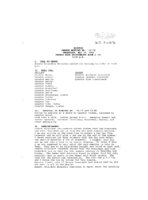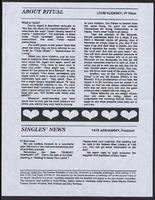Search the Special Collections and Archives Portal
Search Results

Transcript of interview with Fred Gibson by Maisie Gibson, March 9, 1975
Date
Archival Collection
Description
On March 9, 1975, Maisie Gibson interviewed Fred Gibson (born 1927 in Golden, Colorado) about his life in Nevada. Gibson first talks about his family’s background, their move to Nevada, and his education in early Las Vegas schools. He also mentions his service in the U.S. Army, his college education, and his occupation as an engineer at various companies. Gibson then talks about the various locations at which he has lived, his membership in clubs and charitable organizations, and his memories of the first properties on Fremont Street as well as those of the Helldorado Parade. The interview then covers the topics of mining, the atomic testing, economic and environmental changes, and social changes. The interview concludes with a discussion on the growth and development of Henderson, Nevada.
Text

Transcript of interview with Elbert Edwards by Ronald Johns, 1972
Date
Archival Collection
Description
On an unspecified date in 1972, Ronald Johns interviewed Elbert Edwards (born 1907 in Panaca, Nevada) about his life in Southern Nevada. Edwards first talks about his family’s move to Panaca, Nevada in 1864 and talks briefly about his work in Las Vegas public schools during the Great Depression. The two also discuss the Boulder Dam, Edwards’ involvement in politics, and mining in Nevada. He also talks about the cost to build a home in Las Vegas in 1936, the development of Boulder City, and the way of life in the small town of Panaca. The interview then moves on to the topics of the early territorial boundaries of Nevada and Utah, the atomic testing at the Nevada Test Site, and early water sources in Southern Nevada.
Text

Meeting minutes for Consolidated Student Senate University of Nevada, Las Vegas, May 19, 1993
Date
Archival Collection
Description
Text

Interview with Charles E. Violet, May 22, 2004
Date
Archival Collection
Description
Text

Interview with Donald E. English, March 25, 2004
Date
Archival Collection
Description
Text

Interview with James Nobuo Yamazaki, October 14, 2005
Date
Archival Collection
Description
Text

Interview with Native American Forum on Nuclear Issues, April 10, 2008
Date
Archival Collection
Description
Text

Eric Mendoza oral history interview: transcript
Date
Archival Collection
Description
Oral history interview with Eric Mendoza conducted by Holly O'Donnell on November 29, 2021 for Reflections: The Las Vegas Asian American and Pacific Islander Oral History Project. In this interview, Eric Mendoza shares his family's chain migration history from Manila, Philippines to the United States and his difficult immigration and naturalization process once arriving in America in 1996. He talks about what brought him to live in Las Vegas, Nevada, his education and professional pursuits, what his life is like in the United States compared to that of the Philippines, and the lives of his eight siblings. Eric Mendoza discusses the historical past of the Philippines, the infrastructure in place there, and government corruption. He also speaks to Filipino traditions and festivals, food and customs, his cultural identity, and assimilating to American culture.
Text


